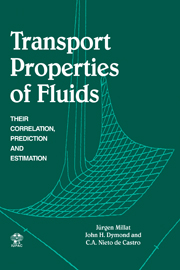Book contents
- Frontmatter
- Contents
- List of contributors
- Foreword
- Part one GENERAL
- Part two THEORY
- 4 Transport Properties of Dilute Gases and Gaseous Mixtures
- 5 Dense Fluids
- 6 The Critical Enhancements
- Part three DATA REPRESENTATION
- Part four APPLICATION OF SELECTED METHODS
- Part five APPLICATION TO SELECTED SUBSTANCES
- Part six DATA BANKS AND PREDICTION PACKAGES
- Index
5 - Dense Fluids
Published online by Cambridge University Press: 07 October 2009
- Frontmatter
- Contents
- List of contributors
- Foreword
- Part one GENERAL
- Part two THEORY
- 4 Transport Properties of Dilute Gases and Gaseous Mixtures
- 5 Dense Fluids
- 6 The Critical Enhancements
- Part three DATA REPRESENTATION
- Part four APPLICATION OF SELECTED METHODS
- Part five APPLICATION TO SELECTED SUBSTANCES
- Part six DATA BANKS AND PREDICTION PACKAGES
- Index
Summary
Introduction
One of the triumphs of the simple kinetic theory of gases was the prediction by Maxwell that the viscosity at constant temperature should be independent of density (pressure), for systems of hard–sphere molecules and also molecules which repel with a force proportional to r−5 (Maxwell 1860, 1867). This somewhat surprising result was, contrary to expectation, found to be in good agreement with experiment up to moderate pressures. For example, the viscosity of argon at 298.15 K increases just slightly from 22.63 μPa s at 0.1 MPa to 22.81 μPa s at 1 MPa (Kestin et al. 1971). At 5 MPa, the viscosity is still only 23.87 μPa s and 25.77 μPa s at 10 MPa. However, as the pressure increases further, the rate of increase in viscosity becomes greater. At the marginally higher temperature of 301.15 K, the viscosity of argon is 104 μPa s at 149.9 MPa and 480 μPa s at 897.1 MPa (Trappeniers et al. 1980).
This difference in the pressure dependence of viscosity between a dilute gas and a dense gas arises because in a dilute gas it is the molecules themselves which transport the momentum; in a dense gas, however, transport of momentum occurs over nonzero distances on collision. The same is true for energy transport (thermal conductivity).
- Type
- Chapter
- Information
- Transport Properties of FluidsTheir Correlation, Prediction and Estimation, pp. 66 - 112Publisher: Cambridge University PressPrint publication year: 1996
- 3
- Cited by



